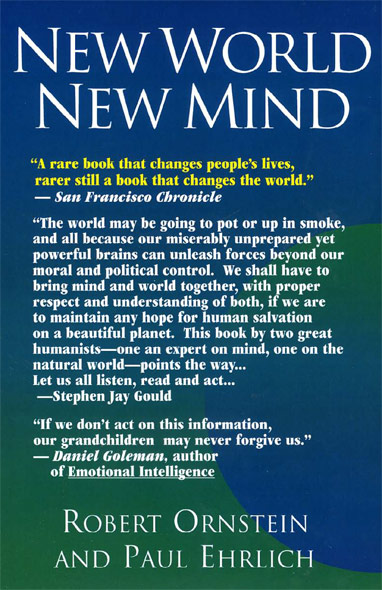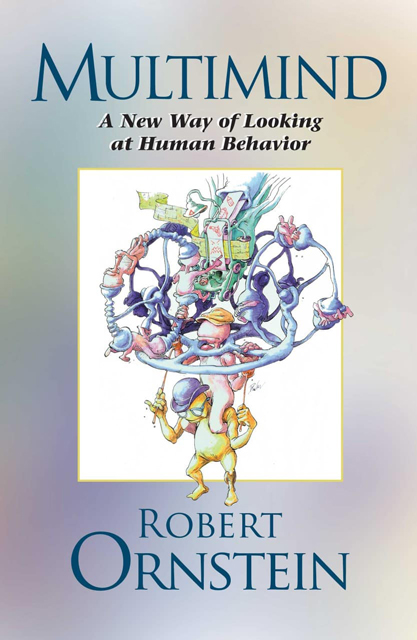
Out on a Limb: The Danger of our Innate Shortsightedness
Dan Sperling | July 8, 2024
The victim is unaware of the danger, until the serial killer finally gets her alone and lets the seductive mask fall from his face, while the terror of her last moments is mocked by her realization that she’d waltzed willingly into his clutches.
As a movie plot, it’s clichéd; but something similar is happening to us all, in real life. And like the on-screen victim, we not only are oblivious to our predicament; we’ve embraced it. The question is whether, unlike her, we’ll perceive the danger in time to escape it.
Our danger, though, comes not from a deadly stranger, but from something within ourselves: a fixation on immediate gratification and short-term gain, at the expense of the big picture. This collective myopia has resulted in a profusion of escalating crises that, in combination, could eventually put an end to our way of life—as the planet grows warmer, poisons pervade the food chain, species go extinct, forests disappear, garbage chokes the oceans, conflict spreads, misinformation runs rampant, and sustainability is taxed in a hundred other ways.
And while we’re aware of these crises as separate issues, we rarely step back far enough from them to see that they’re interlaced threads of a much broader fabric—one that, clutched tightly enough, could become a winding-sheet.
We weren’t always so shortsighted. Half a century ago, the Club of Rome—an international group of scientists, economists, government leaders and business executives alarmed by the slow-motion disasters unfolding on multiple fronts—even gave a name (“the problematique”) to the sum total of these crises, which were recognized as being so interconnected that it would be futile to address them individually.
While the crises have deepened and multiplied since then—driven by the increasing power and reach of our technology—the warnings have not only gotten lost in today’s information overload; they’ve also been buried by a flood of innovations that have captivated us almost to the point of enslavement. From handheld devices to global positioning systems, to artificial intelligence, to the World Wide Web—these tools have been feverishly embraced, without our pausing to consider whether this could be helping to paint us into a corner by entangling us to such an extent that any course-correction becomes impossible.
Not that technology itself is to blame. Rather, it’s a question of perspective. In forging ahead reflexively, we’ve focused on technical feasibility (“If it can be done, let’s do it!”), with little thought as to whether the proposed course of action would be in our best long-term interests.
That kind of heedlessness may be biologically based. In their book New World New Mind, psychologist Robert Ornstein and biologist Paul Ehrlich point out that the human brain evolved to cope with sudden, dramatic, unambiguous challenges—as signaled by the roar of a predator, the pain of a wound, the quick motion of an ambush – which posed the main survival threats in prehistoric times. As a result, the authors explain, we’re neurologically primed to notice the kinds of “loud” occurrences that seldom indicate major threats today, and to ignore subtler cues—such as slow but potentially lethal changes in our circumstances. And the scope of our awareness is further narrowed by other cognitive shortcuts our evolutionary past prompts us to take.
Fortunately, we have the ability to overcome these limitations. Ornstein—in his books The Evolution of Consciousness, The Psychology of Consciousness and God 4.0—notes that, although our mental myopia developed as a “default setting” to deal with the immediate and obvious challenges of long ago, we’re also able to switch to a more comprehensive mode of thought, which is well suited for situations that aren’t clear-cut. Part of the problem, however, is that we’ve forgotten we have such a capacity—which, as a result, lies in abeyance instead of helping us avoid or resolve the messes we make.
The key, says Ornstein, is to learn to tap into that ability; and the first step is to become aware of our default mode. We need to realize that when we don’t take steps to bypass it, our brains, which haven’t changed much in thousands of years, tend to think in terms of individual trees rather than the forest.
Our ancestors appear to have known this, judging by an assortment of heirloom rituals, found the world over, that involve such odd practices as fasting, meditating and whirling, and that seem to be attempts to temporarily deactivate the part of the brain associated with seeing things piecemeal rather than whole. So perhaps we dropped the ball somewhere along the way. But if we don’t pick it up again, and instead continue letting our primitive instincts call the shots, we’ll just keep edging further and further out on a limb—one that, however alluring, is getting progressively thinner, and is already shaking.
Dan Sperling is the author of three books and numerous articles that have appeared in such publications as the Washington Post, Forbes, Geo and USA Today. A version of this article originally appeared in the Pittsburgh Post-Gazette.
Recent Blogs
- An Old Story About Metaphysics
- The Conditioning Machines in Our Back Pockets
- Out on a Limb: The Danger of our Innate Shortsightedness
- Edward T. Hall: Culture Below the Radar
- The Half Brain Method
- 'He Who Tastes Knows': Contemporary Sufi Studies and the work of Idries Shah
- "They Saw a Game"
- A Funny Thing Happened on the Way to Enlightenment
- Finding the Right Way Home
- Time and Self
- Escaping the Either/Or Thinking Trap
- Looking Up, Looking Out
- Conditioning and the Gendered Brain
- New World, Same Mind?
- One Small Word
- Meaning: The Enduring Gift to Spirit
- Beyond East and West: Human Nature and World Politics
- Forest Smarts: A Part of or Apart From?
- How to Improve Group Decision-Making
- We Know More Than We Think We Do
- How Deep Can a Story Go?
- Lost and Found: An Encounter with the Intuitive Mind
- The Devil’s Tuning Fork
- Welcome to The Human Journey Blog


